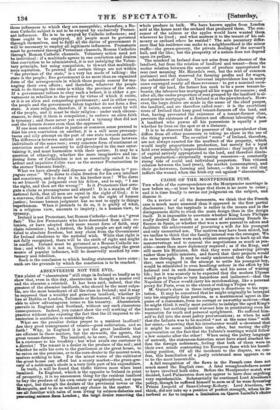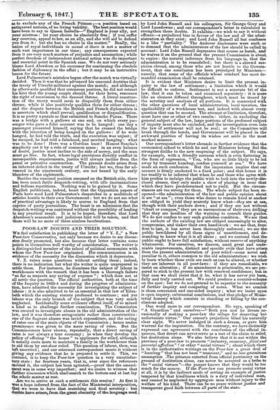CLOSE OF THE MONTPENSIER FUSS.
THE whole of the correspondence on the Montpensier marriage is now before us,—at least we hope that there is no more to come ; and it is time finally to revise our judgment on. the subject,. and dismiss it On a review of all the documents, we think that the French case is much more unsound than it appeared in the first partial disclosures ; but the turpitude is rather in the means and in the disingenuous shifts to cloak the main. design than in, the design itself. It is impossible to ascertain whether King Louis Philippe really desired the match as a means of advancing French in- fluence in Spain, or whether that was a mere pretext to adorn an& facilitate the achievement of procuring a wife for his youngest and only unmarried son. The motives may have been mixed, but we incline to think that the family interest was the stronger. We do so because there were such evident attempts to hush up-all the manceuveriugs and to conceal the negotiations as much as pos- sible—more than mere diplomacy required ; as if the King, and still more his Minister, felt that they were subserving private rather than public interests, and feared that their projects would- be seen through. It may be easily understood that the aged fa- ther, once engaged in the attempt to settle his youngest boy,. would be stimulated to even headlong ardour in the effort by his habitual zeal in such domestic affairs and his sense of waning life ; but it was scarcely to be expected that the modern Ulysses would go to lengths so very hazardous and. indiscreet—that the Napoleon of Peace would carry his matchmaking, like a paternal proxy for Paris, even to the extent of risking a Trojan war.
M. Guizot's share in these intrigues is disastrous to his repu- tation. It may be conceived that he might originally be betrayed_ into his singularly false position, as a matrimonial agent in dis- guise of a statesman, from no corrupt or unworthy motives—that he might think it really most patriotic to indulge the aged King's humour; but nothing could warrant him in prostituting even his reputation for truth and personal uprightness. He suffered him- self to fall into the most paltry prevarications; as when he said that the Infanta was to be married "not at the same time" with her sister,—knowing that his interlocutor would uederstand that it might be some indefinite time after, but resting the silly equivocation on the fact that the Infanta's marriage would follow a few minutes after the other When using the paltry language of untruth, the statesman-historian must have stood abashed be- fore the foreign nobleman, .feeling that both of them were in their own minds contrasting his European fame with his hutnil- iating position. Of all the incidents to the dispute, we con- fess, this humiliation of a justly celebrated man appears. to US to be the most lamentable.
A full recognition of the flaws in the French case does not much mend the English case. A fatal wrongheadedness seems to have involved both sides. Before the Montpensier match was decided, Lord Palmerston does not appear to have done anything very reprehensible. Substantially he continued Lord Aberdeen:s policy, though he suffered himself to seem. as if he were favouring' Prince Leopold of Saxe-Coburg-Kohary. Lord Aberdeen, we think, did not take up a position of perfect strength, when he in- terfered so far to impose_ a. limitation. on. Queen Isabella'S choice as.to exclude any of the French Princes ;—a position based on, antiquated notions, of no living validity. The best position would. have been to say to Queen Isabella—" England is your ally, not your mistress : let your choice be absolutely free ; if you suffer any coercion, appeal to her, as an ally, and she will aid to defend you from it : but she has no choice in the matter." Really, the union of royal individuals in =ens(' et them is not a matter of such vast importance in our time; any consequences expected from it are very much matters of prejudice and assumption ; while perfect freedom of independent national action was the important and essential point in the Spanish case. We do not very seriously blame Lord Aberdeen or his successor for continuing the obsolete fashion of diplomacy in the affair ; but it may be an instructive lesson for the future.
Lord Palmerston's mistakes began after the match was virtually decided. Then it was that he advanced his unsound doctrine that the treaty of Utrecht militated against the match; and although he afterwards qualified that erroneous position, he did not retract his hint that the young couple should, for their heirs, renounce the right of succession to the Spanish throne. A literal construc- tion of the treaty would seem to disqualify them from either throne, while it also positively qualifies them for either throne ; and the dispute between the British and French diplomatists is to ascertain which shall prevail, qualification or disqualification. It is as pretty a puzzle as that submitted to Sancho Panza. There was a bridge with a gallows at one end, on which every pas- senger who gave a false account was to be hanged : one clay a passenger presented himself, saying that he crossed the bridge with the intention of being hanged on the gallows : if he were hanged, he had told the truth, and the execution was unjust; if he escaped, he had told a falsehood, and merited hanging : what was to be done ? Here was a Gordian knot! Honest Sancho's simplicity cut it by a rule of common sense : in an even balance of doubt, justice must incline to the side of mercy, and the man must go free. In fact, where legal provisions directly conflict in incompatible requirements, justice will always incline from the penal or privative construction. The present doubt arises from an inherent defect in the treaty of Utrecht ; but we, thus far ad- vanced in the nineteenth century, are not bound by the early blunders of the eighteenth.
Besides the unsound position assumed on the British side, there has been much futile despatch-writing, with idle incriminations and tedious repetitions. Nothing was to be gained by it. Some English politicians, indeed, boast that the Opposition papers of Paris have used Lord Palmerston's despatches m a multitude of articles hostile to their own Government : but we do not see what of practical advantage is likely to accrue to England from that caprice of party journalism. The boast is an admission that the despatch-writing was continued without the possibility of leading to any practical result. It is to be hoped, therefore, that Lord Aberdeen's seasonable and judicious hint will be taken, and that there will be no more of these aimless lucubrations.



























 Previous page
Previous page